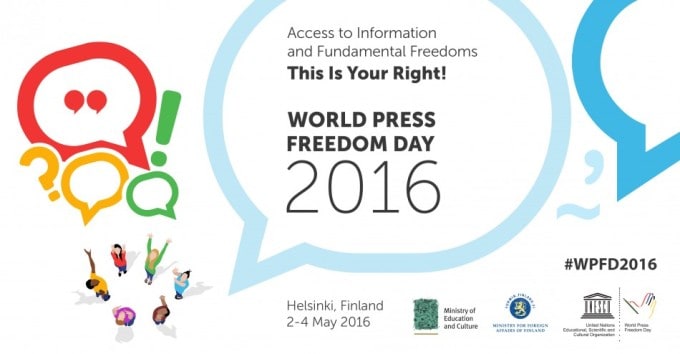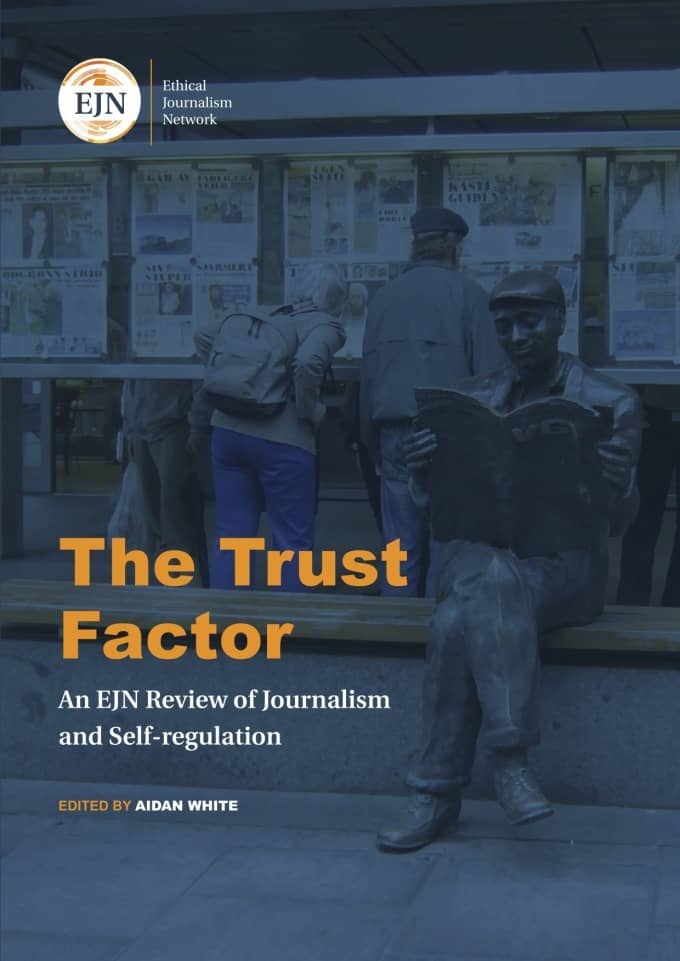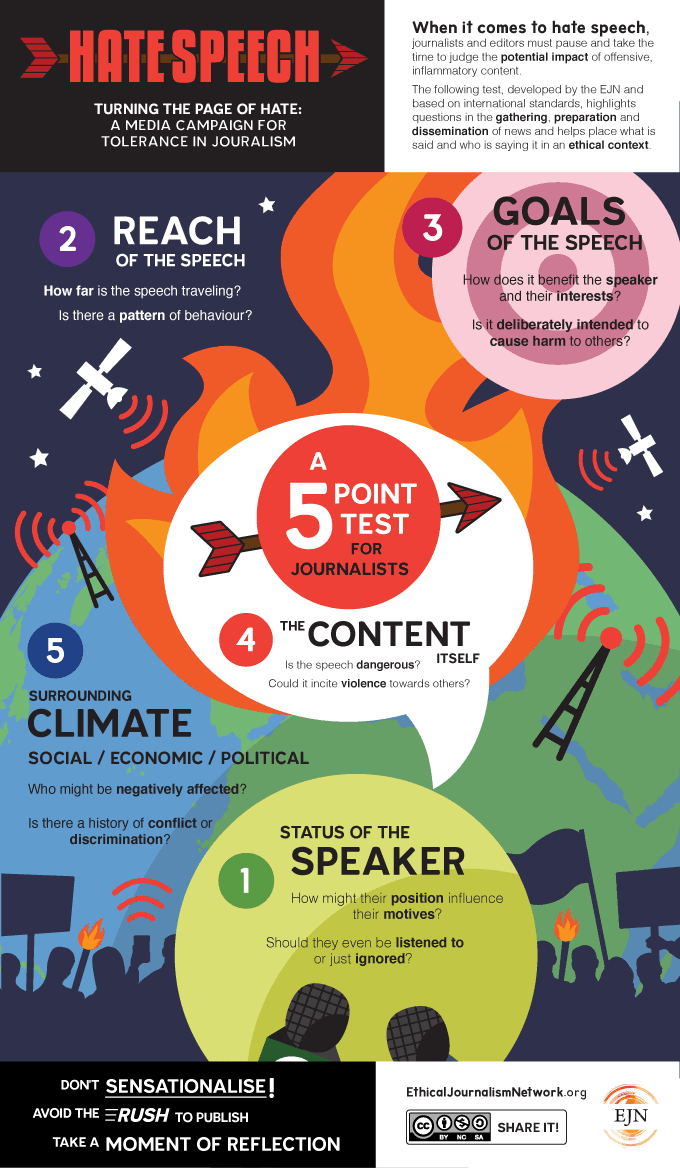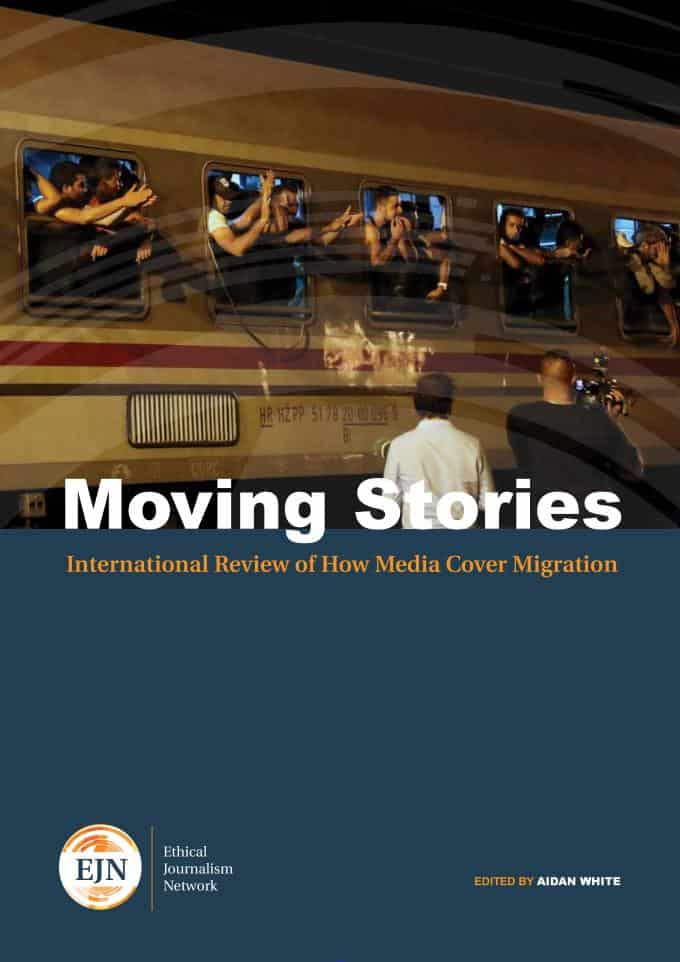World Press Freedom Day 2016: Journalism must take a lead in countering hate-speech and propaganda

Ethical Journalism Network Press Release
28 April 2016
Around the world, the information crisis is defined by more government surveillance and interference, more corporate snooping and exploitation of personal information, and a growing trend of abuse in online speech.
To mark World Press Freedom Day on May 3rd the Ethical Journalism Network is calling for quality journalism and ethical communications to be promoted in order to counter these dangerous trends.
“Journalists must be free to exercise their profession without a climate of fear and intimidation,” the Ethical Journalism Network’s director, Aidan White, said in a statement.
“Ethical values in media are not marginal to democracy, they are essential to confronting the crisis of self-censorship, propaganda and hateful communications which is emerging around the world.”
The Ethical Journalism Network has launched campaigns to combat hate speech in key areas of reporting including migration and journalism in areas of conflict and social dislocation and has developed a five-point test to help journalists identify and eliminate hate speech in their work.
In 2016 the EJN is working with universities and journalism schools to promote new public dialogues with policymakers and civil society groups to encourage media literacy at all levels using the core values of journalism as an inspiration for more responsible free expression.
“Everyone has the right to free speech, but that must not be abused by a lack of respect and intolerance of others,” says White.
“Humanity, accuracy and transparency in our communications are core elements of ethical journalism that can provide benchmarks for more responsible public communications.”
In particular, the Ethical Journalism Network is calling for more action to eliminate misogyny and abuse of women in online communications.
“Media must do more to eliminate gender stereotypes that encourage discrimination, but today there is an emerging and growing threat from online misogyny outside the media sphere that requires a concerted effort from web companies, policymakers and users to isolate and eliminate hate directed at women.”
EJN Press Contact: Tom Law
Email: [email protected]
Countering Hate Speech in the Media through Ethics and Self‐Regulation

On 3 May the Ethical Journalism Network’s director Aidan White is chairing a panel discussion at UNESCO’s World Press Freedom Day celebrations in Helsinki, Finland on how to identify and counter hate speech without creating environments that result in the censorship of legitimate expression.
The session will explore the efforts of press councils and media ombudsmen to create self‐regulatory systems to encourage journalistic ethics in public communications to a larger role in fighting hate speech.
Last year the Ethical Journalism Network produced an international review of self-regulation to outline both the good practices that industry bodies and journalists’ unions have sought to encourage in newsrooms as well identify malpractices and weaknesses.
The report – The Trust Factor – tests how well journalism is monitored and its mistakes handled in 16 countries, including challenging hot spots in the Middle East, Africa, Latin America and Asia.
Systems of self-regulation of media and journalism need radical rethinking if they are to survive the harsh economic and political realities of news media in the digital age, the report concludes.
Turning the page of hate

In response to the Rabat Plan of Action, the Ethical Journalism Network created a five-point test to help journalists and others identify hate speech. You can download the test in English, French and Arabic. The five-point test was part of UNESCO’s World Radio celebrations in February and has been used by journalists in Rwanda, Tanzania and around the world.
The session on hate-speech at the World Press Freedom Day celebrations in Helsinki will be will explore:
How do news media internal practices and codes of conduct to counter hate speech translate to journalism done in the field?
How could self‐regulatory experience in news media be used to inform other actors such as social media producers, and the owners of Internet communications platforms?
In what ways can Media and Information Literacy help audiences to deal with dangerous speech?
Date: Tuesday 3 May 2016
Time: 16:15-17:45
Venue: Finlandia Hall, Veranda 4
Organisers: International Federation of Journalists | Finnish Union of Journalists | Finnish Council for Mass Media
Moderator: Aidan White, Director, Ethical Journalism Network
Panellists
- Zuliana Lainez, Secretary General, Asociación Nacional de Periodistas del Perú (Peru)
- Elina Grundström, Chair, Council for Mass Media in Finland (Finland)
- Ljiljana Zurovac, Executive Director, Bosnia Herzegovina Press Council (Bosnia and Herzegovina)
- Mogens Blicher Bjerregård, President, European Federation of Journalists (Denmark)
- Nezar Patria, Member, Indonesian Press Council (Indonesia)
- Poni Alice Jame Kolok, Radio and TV Journalist (South Sudan)
EJN Press Contact: Tom Law
Email: [email protected]
Moving Stories
An International Review of How Media Cover Migration

Journalists often fail to tell the full story about migration and refugees and routinely fall into propaganda traps laid by populist-leaning politicians, the director of the Ethical Journalism Network told a meeting of the United Nations human rights agency on Thursday 21st April in Geneva.
The meeting at the Office of the High Commissioner for Human Rights – a new initiative to tackle hate speech, extremism and propaganda, particularly on the issue of migration.
Ahead of the meeting, the EJN’s Director Aidan White, the editor of Moving Stories – An International Review of How Media Cover Migration, said:
“The migration story remains a supreme challenge for journalism. It is a global story that we need to tell with humanity and without giving voice to hatred and extremism.
“It’s time for policymakers and media leaders at the international level to focus on practical ways of helping journalists to tell the story and to pose legitimate questions about integration, limited resources and potential cultural conflicts without resorting to sensationalism.
“The EJN is looking for practical ways to help journalists and their media. Issues will include access to information, avoiding political bias, giving voice to migrants, isolating political hate-mongers and keeping the focus on the role of media to report accurately.
“The current information climate is toxic, particularly in Europe, and we need to ensure media focus on ways in which they can promote dialogues and help people get information that will help them better understand the complex background to the migration and refugee question.”
Foreword | Introduction | Recommendations
Moving Stories reviews media coverage of migration in the European Union and in 14 countries across the globe.
The 100-page report highlights
Missed Opportunities: How journalists and media in Europe failed to raise the alarm about an imminent influx of refugees fleeing war in Syria and Iraq, even though the story was there to be told a year before the crisis broke in 2015;
Hate-Speech: How outrageous anti-migrant or anti-Muslim statements by politicians like Donald Trump in the United States and some European leaders fuelled increasing public concern and hijacked media coverage;
Falling Standards: How media fail to provide detailed and reliable information about the refugee crisis because of a lack of editorial resources or the presence of well-informed journalists able to provide in-depth and sensitive reporting;
Sensationalism: How much journalism is driven by hyperbole, intolerance and distortion with media in confusion over what are the correct terms to use to describe migrants, refugees, and asylum-seekers.
To counter these problems, the report recommends that news media take urgent action to appoint specialist reporters to the migration beat. It also calls for industry-wide and in-house training on migration issues and problems of hate speech; improved links with migrant and refugee groups; and more employment of journalists from ethnic minority communities to strengthen diversity in newsrooms.
The report highlights how media coverage, much of it negative and focused on numbers of migrants on the move, took a dramatic turn with the death of Alan Kurdi and the publication of pictures of his body on a beach in Turkey. From that moment journalism woke up to the human tragedy within the migration story.
In his foreword to the report Jan Egeland, secretary-general of the Norwegian Refugee Council, sums up the challenge facing media: “It is not just a lack of humanity on the news agenda or a matter of luck or a matter of caring more about some people at the expense of others,” he says. “We need a broader lens to see what really is going on.”
The lack of a wider perspective often leads the media to miss the link between migration and human development. Journalists often ignore the evidence of serious studies that illustrate how migration, despite short-term challenges, is invariably beneficial for economic and cultural development in the longer term.
The report states: “There is a tendency, both among many politicians and in sections of the mainstream media, to lump migrants together and present them as a seemingly endless tide of people who will steal jobs, become a burden on the state and ultimately threaten the native way of life. Such reporting is not only wrong; it is also dishonest. Migrants often bring enormous benefits to their adopted countries.”
The report covers the EU and 14 countries
The report examines media coverage in a diverse range of countries. From Australia, a country built by migrants, where media struggle to apply well-meaning codes of journalistic practice within a toxic political climate to Nepal and the Gambia which are exporters of labour. In these countries, censorship or a lack of resources – or a combination of both – are mainly to blame for poor coverage.
The reports on migration in China, India and Brazil tell another story. Though large numbers of people migrate from each of these countries, the main focus is on internal migration, a global phenomenon often ignored by mainstream media that involves millions and dwarfs international migration numbers. The biggest movement of people in history has taken place in China over the last 35 years.
In Africa, while headlines focus on people leaving the continent and heading north, there is also migration between countries, with many people from the impoverished central regions heading for South Africa – a country where media also deal with problems of xenophobia and governmental pressure.
In Europe, where migration and refugee issues have shaken the tree of European unity, media struggle to provide balanced coverage when political leaders respond with a mix of bigotry and panic – some announcing they will only take in Christian migrants while others plan to establish walls and razor wire fences. The report looks at Bulgaria where media have allowed sensationalism to dominate migration reporting and Italy, where hate speech is counterbalanced by a purpose-built ethical charter for media. In Britain the report notes how the story is often told without a sense of scale or balance with extensive reporting on the plight of people at a small refugee camp in Calais.
In Turkey, seen by many European politicians as a key country in stemming the onward rush of migrants, most media are under the thumb of a government that punishes dissident journalists, so public debate is limited. In Lebanon – which hosts millions of refugees from war-torn Syria – the story is not helped by many media confusing the picture by mixing of fact and opinion.
In the United States, the controversial Republican presidential candidate Donald Trump has made migration an explosive topic. Media time has focused on heated and often racist exchanges, which obscures some fine journalism that provides much-needed context. South of the border, media in Mexico suffer from undue political pressure and self-censorship.
— ENDS –
EJN Press Contact: Tom Law
Email: [email protected]